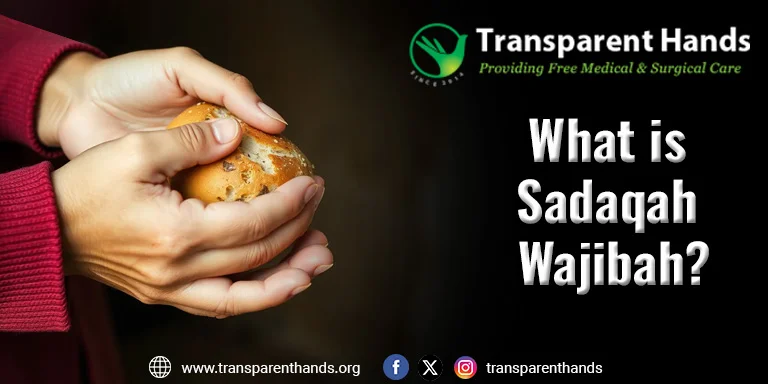What is Sadaqah Wajibah?

While Zakat is widely recognized as the most important form of charity in Islam, some people are not fully aware of the significant spiritual benefits of giving Sadaqah, which is a voluntary form of charity in Islam. However, Sadaqah Wajibah is an obligatory form of Sadaqah which also includes Zakat. In this article, we aim to understand the importance of Sadaqah Wajibah and the situations that may necessitate it.
What is Sadaqah Wajibah?
Sadaqah Wajibah is a type of charity that is binding in nature. Sadaqah Wajibah becomes obligatory on certain occasions and must be met according to the recommendation of Sharia. Sadaqah Wajibah covers almost all kinds of charity in Islam, including Zakat. However, the term is not very commonly used. Many believers attribute Sadaqah Wajibah to Sadaqah Fitr only; however, there are other forms of Sadaqah Wajibah that we should be aware of.
Donate Sadaqah to Avoid Troubles.
Types of Sadaqah Wajibah
There are five different types of Sadaqah Wajibah, which we will explore in the following sections.
1- Sadaqah Fitr
As humans, we are prone to making mistakes. The purpose of Sadaqah Fitr is to purify the fasting and worship during Ramadan. The following Hadith establishes the importance of Sadaqah Fitr:
“Ibn ’Abbas (RAA) narrated, ‘The Messenger of Allah (ﷺ) enjoined Zakat-ul-fitr on the one who fasts (i.e. fasted during the month of Ramadan) to purify him from any indecent act or speech and for the purpose of providing food for the needy. It is accepted as Zakah for the person who pays it before the Eid prayer and it is Sadaqah (i.e. voluntary charity) for the person who pays it after the Eid prayer.’ Related by Abu Dawud and Ibn Majah and Al-Hakim graded it as Sahih.” (Bulugh al-Maram)
Another purpose of paying Sadaqah Fitr is to involve deserving sections of the society in Eid Celebrations. Sadaqah Fitr should be paid before the start of the Eid al-Fitr prayers, so Allah (SWT) may forgive any transgressions that we might have made involuntarily during Ramadan. The Quran reminds us:
“And Allah wants to lighten for you [your difficulties]; and mankind was created weak.” (Surat An-Nisā’, 4: 28).
Sadaqa Fitr for children should also be paid. The minimum amount for Sadaq Fitr in 2025 was Rs. 180, which was equivalent to one Sa’ of wheat. However, affluent individuals are encouraged to use more expensive commodities to calculate their Sadaqa Fitr obligations.
2- Nadhr
Nadhr refers to making a promise to Allah (SWT) to perform a specific act of worship, including charity, or to abstain from an activity as an expression of devotion and gratitude. According to a Hadith:
Allah’s Messenger (ﷺ) said: “The atonement for a vow (Nadhr) is (the same as) the atonement for an oath (Yamin).” [Reported by Muslim]. at-Tirmidhi added, “If he did not specify it.” [And he graded it Sahih (authentic)]. (Bulugh al-Maram, 1385)
Hence, Nadhr is a conditional charity that must be fulfilled and honored. Not fulfilling what one swore is a sin, and there is another form of Sadaqah that must be paid to make up for it. Nadhr can be paid in the form of food or monetary charity to seek Allah’s (SWT) blessings.
3- Fidya
Fasting in Ramadan is obligatory for all Muslims. However, some individuals miss out on fasting due to poor health. Fidya allows such people to compensate for missing out on the fasts.
The Prophet (ﷺ) said:
“Indeed, this religion is easy, and no one will ever overburden himself in religion, except that it will overcome him. So seek what is appropriate, and come as close as you can, and receive the glad tidings (that you will be rewarded), and take it easy; and gain strength by worshipping in the mornings, afternoons, and during the last hours of the nights.’” (Sunan an-Nasa’I, 5034)
However, one must remember that Fidya is only permitted under specific conditions. The individual must make up for missed fasts after they have recovered. In that case, the given amount will be considered a Sadaqah.
The Fidya amount must be given for each missed fast. The amount must cover the cost of feeding a deserving person for a day, or two deserving persons for either Sahur or Iftar. The standard amount for this donation is approximately equal to PKR 500 for every missed fast. However, Allah (SWT) likes generosity, and believers are urged to be even more generous by increasing the Fidya amount when possible.
The Quran says:
“Who is it that would loan Allah a goodly loan so He may multiply it for him many times over? And it is Allah who withholds and grants abundance, and to Him you will be returned.” (Surat Al-Baqarah, 2:245)
4- Kaffarah
Human beings are susceptible to sin. However, Allah (SWT) likes believers who admit their sins and repent. The Quran tells us:
“And the two who commit it among you, dishonor them both. But if they repent and correct themselves, leave them alone. Indeed, Allah is ever Accepting of repentance and Merciful.”(Surat An-Nisā’, 4:16)
Kaffarah is a way of redemption. The following situations may necessitate it:
- Breaking a fast
- Breaking a sworn oath
- Violating Hajj rituals
- Accidental killings and other situations
Kaffarah for breaking a fast can be paid by consecutively fasting for 60 days, or feeding 60 deserving Muslims two meals each day, or providing money equivalent to Sadaqa Fitr for 60 deserving people.
The Kaffarah for breaking an oath is feeding ten needy people, clothing ten deserving people, or freeing a slave. The Quran tells us:
“Allah will not impose blame upon you for what is meaningless in your oaths, but He will impose blame upon you for [breaking] what you intended of oaths. So its expiation is the feeding of ten needy people from the average of that which you feed your [own] families or clothing them or the freeing of a slave. But whoever cannot find [or afford it] – then a fast of three days [is required]. That is the expiation for oaths when you have sworn. But guard your oaths. Thus does Allah make clear to you His verses that you may be grateful.” (Surat Al-Mā’idah, 5:89)
The Kaffarah for violating the Hajj ritual depends on the nature of the violation and whether it was done intentionally or unintentionally. The Kaffarah for accidental killing is also a serious matter that depends on the circumstances.
5- Udhiyyah
Udhiyyah or Qurbani is an animal sacrifice made during Eid al-Adha. It is an obligatory ritual that is also a Sunnah of the Prophet (ﷺ). It is one of the most important types of Sadaqah Wajibah. Every year, millions of Muslims perform animal sacrifices to honor Hazrat Ibrahim’s (AS) steadfast faith. Goats, sheep, cows, buffaloes, and camels are sacrificed during this time. Udhiyyah allows believers to get closer to Allah (SWT) while also helping those in need enjoy nutritious food.
Why Pay Your Sadaqah Wajiba to Transparent Hands?
Consider Transparent Hands for your Sadaqah Wajiba. We provide medical and surgical assistance to deserving patients in Pakistan. We are Sharia-compliant, and we collect and spend charity according to Islamic laws. Transparent Hands has helped 250,000 deserving patients since 2014. We also organize medical camps to reach out to deserving patients in low-income areas. Your Sadaqah, Zakat, or other donations can help change someone’s life.
Conclusion
Sadaqah Wajibah consists of various forms of obligatory charity. From Sadaqah Fitr, which purifies our worship and includes the less fortunate in our celebrations, to Nadhr, Fidya, and Kaffarah, these acts serve as reminders of our obligations to Allah (SWT) and to our community. Each type of Sadaqah Wajibah emphasizes the significance of compassion, accountability, and generosity in our daily lives. By understanding and adhering to these principles, we not only fulfill our religious duties but also strengthen our bonds with those around us, fostering a sense of unity and support within the Muslim community.
Donate now to Transparent Hands to assist deserving Pakistani patients
Read more: Benefits of Giving Sadaqah
Read more: Sadaqah Halts Seventy Doors of Evil











Leave a Reply